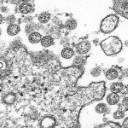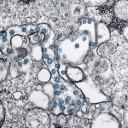-
Testing Cancer Patients for the Coronavirus
Cancer centers are taking advantage of their in-house molecular laboratories to selectively test certain cancer patients for the coronavirus.
by Anna Azvolinsky
-
March 27: The Week in Cancer News
Cancer patients and survivors share tips for coping with the uncertainty and isolation brought on by the coronavirus, and the coronavirus is impacting cancer clinical trials and treatment.
by Kate Yandell and Marci A. Landsmann
-
The Coronavirus Impacts Cancer Clinical Trials
The National Cancer Institute and the Food and Drug Administration have provided guidance for managing clinical trials amid the spread of the novel coronavirus. Cancer centers are making changes to care for some patients enrolled in trials.
by Anna Azvolinsky
-
A Unified Strategy
A couple who lost their daughter to brain cancer builds a charity that connects parents, hospitals and researchers with data.
by Marci A. Landsmann
-
March 20: The Week in Cancer News
The spread of the coronavirus is having an impact on cancer care, and the Food and Drug Administration will require cigarette packaging and advertisements to come with new graphic warning labels.
by Kate Yandell
-
The Coronavirus and Cancer Care
Cancer patients in the U.S. are feeling impacts from the new coronavirus.
by Kate Yandell
-
Medicare Coverage for Next-Generation Sequencing Tests
Multigene panels that rely on next-generation sequencing are increasingly used to test for hereditary cancer risk-related mutations. The federal government aims to expand Medicare coverage for these tests.
by Ashley P. Taylor
-
March 13: The Week in Cancer News
Experts offer information and cancer centers take precautions in light of the novel coronavirus, and the Food and Drug Administration approves an immunotherapy combination for liver cancer.
by Kate Yandell
-
March 6: The Week in Cancer News
A report shows that colorectal cancer incidence is decreasing in older adults while simultaneously rising in younger individuals, and the Food and Drug Administration approves a new treatment for multiple myeloma.
by Kate Yandell
-
For Prostate Biopsy, It’s Best to Combine Old and New Methods
Using an older method of prostate biopsy together with MRI-targeted biopsy more accurately diagnoses prostate cancer than either method alone, a study finds.
by Kate Yandell
Cancer Talk
Lessons From 20 Years Living With Cancer
Multiple myeloma survivor Jonathan Gluck reflects on uncertainty, and the scientific progress that has kept him living with cancer for more than two decades.
by Eric Fitzsimmons
The Enduring Importance of Cancer Disparities ResearchOpening session from AACR conference highlights how perseverance and adversity have informed cancer disparities research over the years.
by Eric Fitzsimmons
Most Cancer Survivors Don’t Meet Healthy Diet GoalsDespite research linking fruits and vegetables to cancer survival, many people do not change their eating habits after diagnosis.
by Darlene Dobkowski
Many People Don’t Get Colonoscopy After Receiving Abnormal Blood TestsAbout half of people who receive abnormal results from colorectal cancer screening tests don’t follow up with a colonoscopy.
by Laura Gesualdi Gilmore














